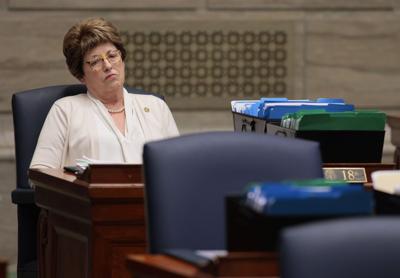
Senate Majority Leader Cindy O’Laughlin, R-Shelbina, listens on Thursday, May 16, 2024, as Sen. Bill Eigel, R-Weldon Spring, speaks on the Senate floor one day before the end of legislative session.
JEFFERSON CITY — The Missouri Legislature ended its regular session on Friday without sending voters a ballot question that would make citizen-led initiative petitions more difficult to enact.
In the Senate, Majority Leader Cindy O’Laughlin, R-Shelbina, moved Friday morning to adjourn the legislative session without first trying to conduct any official business.
That was a reflection of the paralyzed state of the Senate — a chamber where two factions had engaged in record-breaking speaking filibusters in the final two weeks of the session.
“I never know what might be going to come up,” O’Laughlin told reporters, adding she thought it would be good to end “in a cordial way.”
In the House, lawmakers worked into the afternoon, approving a wide-ranging crime bill, alterations to a senior property tax relief law signed last year, and more.
People are also reading…
The final week of session had been dominated by a 50-hour filibuster by Democrats who demanded changes to a potential ballot question that would make future constitutional amendments harder to approve.
The filibuster ended when some Republicans joined with Democrats to vote for more negotiations with the House. But that triggered backlash from Senate members of the hard-right Missouri Freedom Caucus, who favored the House version.
Following a string of progressive wins at the ballot box, the GOP-backed ballot question would’ve required future constitutional amendments to win majorities in five of Missouri’s eight congressional districts to take effect.
The House loaded up the ballot question with provisions unrelated to the higher threshold in an effort to ease its passage.
But faced with a wall of Democratic opposition in his chamber, Senate President Caleb Rowden, R-Columbia, put the onus of passage on the House.
In a message on social media, Rowden said Friday morning the House could accept the Senate bill without the “ballot candy” and send the initiative petition question to the ballot.
“The only way IP Reform will be on the ballot in 2024 is for the House to act on the Senate bill,” Rowden wrote.
His request was quickly parried by House Speaker Dean Plocher, R-Des Peres, who called an early news conference to press Rowden to force a vote in the Senate instead.
“This is not our problem,” Plocher said. “This is not our mess.”
Plocher said if the Senate does not act and voters choose to restore abortion rights at the ballot box later this year, it will be the Senate’s fault.
“The burden of abortion falls squarely on the Senate,” said Plocher, who was flanked by more than 30 members of the House GOP caucus.
The House ultimately didn’t take up the Senate version stripped of sweeteners.
The so-called “ballot candy” included a prohibition on noncitizens voting on constitutional amendments, and would have also barred foreign interference in constitutional amendment campaigns.
Ranked-choice voting
Missouri voters were still poised to weigh in on noncitizen voting this year, even though U.S. citizenship is already required to vote.
The House on Friday sent to voters a constitutional amendment that would bar ranked-choice voting. It also would limit voters to one vote if there is only one open seat in an election.
In addition to the ranked-choice limit, the ballot question also asks if only U.S. citizens should be allowed to vote.
The ballot question follows an ill-fated Missouri Agrees campaign for 2024 to institute approval voting in Missouri, a method in which voters can express support for more than one candidate in an election.
With regard to the ranked-choice language, the measure exempts nonpartisan elections in St. Louis, which instituted an “approval voting” system first used in the 2021 municipal elections.
Under the St. Louis system, voters are allowed to vote for as many candidates as they approve of, and the top two-candidates advance to a run-off election.
Child marriage
One casualty of the session’s end was a bill that would raise the legal age of marriage in Missouri to 18 in all instances.
The minimum marriage age in Missouri is currently 16 with a parent’s written permission, and anyone age 21 or older cannot marry a minor.
Rep. Jim Murphy, R-south St. Louis County, said Friday morning the House wouldn’t take final action on the plan, which previously cleared the Senate with near-unanimous support.
Murphy said the bill was placed on the House calendar too late to be debated Friday. A House rule says the House can’t take up a Senate bill for the first time unless it sits on the House calendar for at least one legislative day.
Two House Republicans — Rep. Dean VanSchoiack of Savannah and Hardy Billington of Poplar Bluff — voiced opposition to the bill in a recent Kansas City Star article.
“Why is the government getting involved in people’s lives like this?” VanSchoiack told the Star. “What purpose do we have in deciding that a couple who are 16 or 17 years old, their parents say, you know, ‘you guys love each other, go ahead and get married, you have my permission.’ Why would we stop that?”
Sen. Holly Thompson Rehder, R-Scott City, the sponsor of the Senate bill, criticized the inaction Friday morning.
“Banning child marriage should not be controversial,” she said.
The legislation on constitutional amendments is Senate Joint Resolution is 74. The ranked-choice legislation is Senate Joint Resolution 78. The marriage legislation is Senate Bill 767.
Missouri's Legislature reflects the federal structure in many ways. Video by Beth O'Malley


















